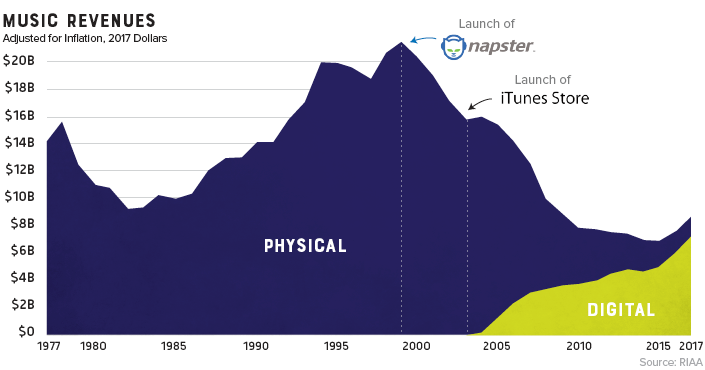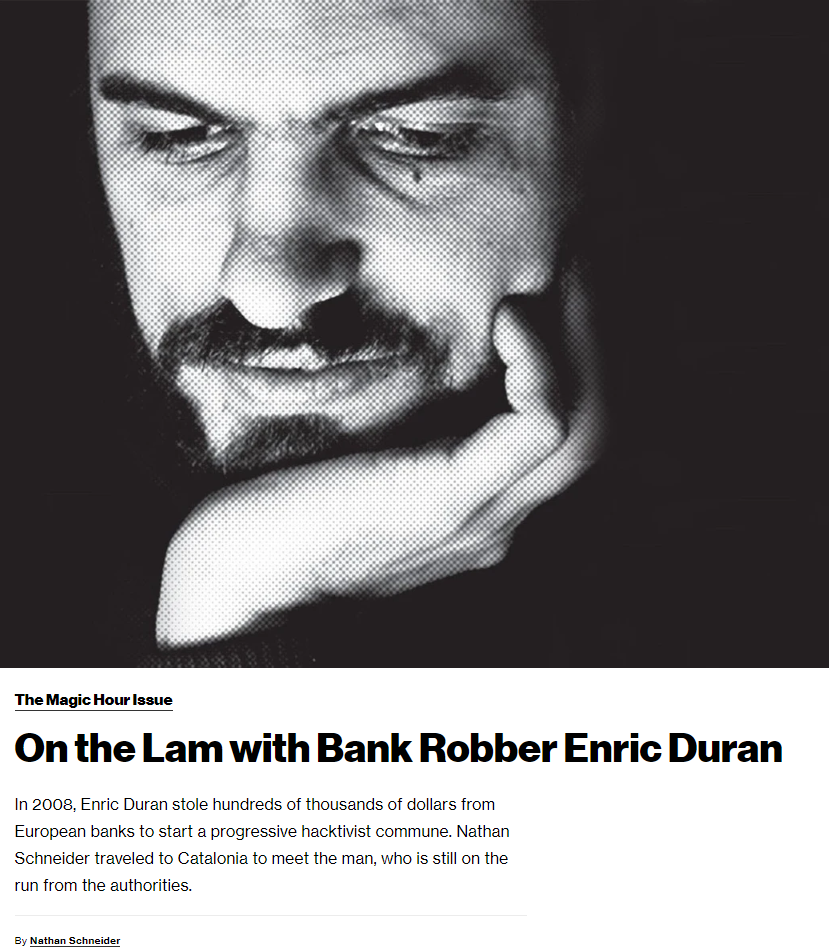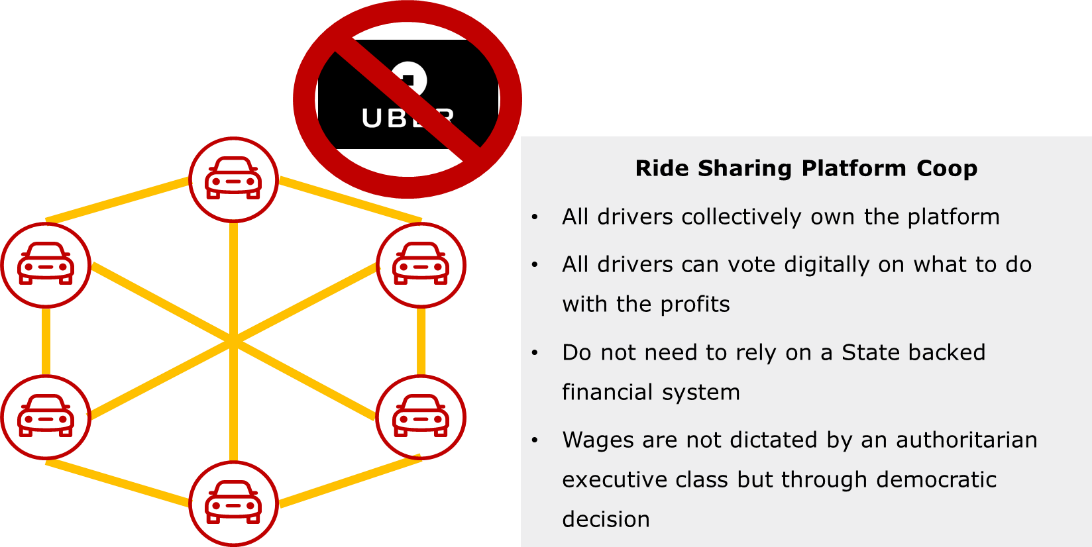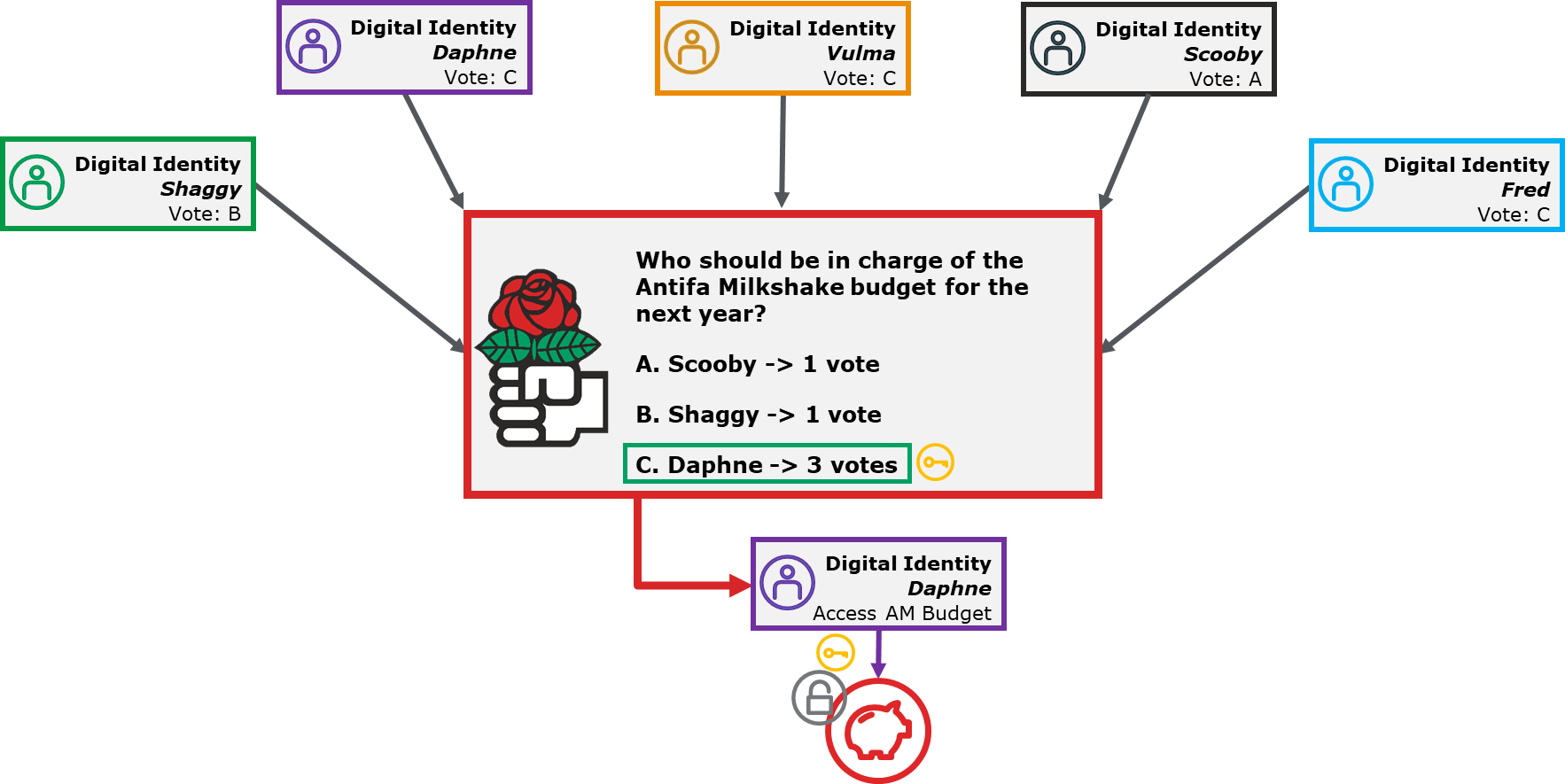This is Part 3 of the Blockchain 101 series of posts. If you haven’t already, check out Blockchain 101 (Part 1) and Blockchain 101: The Technical Stuff (Part 2).
In order to first understand what blockchain can give to the Left, let’s define what the Left broadly wants to achieve. We could reduce it to “Seize the means of production for the proletariat” or “Fully Automated Luxury Gay Space Communism” but let’s be more specific. These goals can be roughly divided into short, medium, and long term.
Short Term: Weaken Capitalist institutions while growing an economic ecosystem that offers an alternative mode of production based on working class solidarity. (Also fight back against rising Fascism and prevent Climate Catastrophe.)
Medium Term: End Capitalism as the main mode of production in the global economy and institute a democratically owned economy from the growing alternative mode of production, or Socialism
Long Term: Create a classless, stateless, and abundant society, or Communism

It’s the best type of Communism (Meme Source)
So how can blockchain help achieve these goals? Well first let’s look at how other P2P Networks have helped. Remember in Part 2 when we looked at P2P file sharing programs like Napster and how it made it very easy for people to download music for free? Even though programs like Napster were shut down or changed their business strategies after long legal battles, it had a profound effect on the music industry to the chagrin of record companies.
If you take a look at the graph below, you’ll see that from the 80s to about 1999 when Napster was released, the music industry was growing in total revenue at a steady pace. Then you see revenues go into free fall after the release of Napster. “The market” tried to respond with the iTunes Store to convince people to buy songs at $0.99 a pop instead of downloading free music from a file sharing program. As you can tell from the graph, it didn’t work, and today revenues for the music industry are still half of the 1999 peak. What prevented the music industry from going to zero was the capitalist attempt at synthesizing P2P file sharing services’ offer of limitless music at your fingertips with venture capital paid UX designers and a business model. Now today the music industry is heavily reliant on music streaming services like Spotify that offer free streaming with advertisements or no advertisements for a monthly subscription without fearing that you will be charged by a court to pay $220,000 for downloading 24 songs illegally.

Who would win? The entire music industry or a bunch of file-sharing bois?
P2P Networks were able to cut yearly music industry revenues by $10 billion. That’s some serious ~degrowth~ and ~disruption~. Now the music industry isn’t the most exploitative industry on the planet and musicians should be paid fairly for their work. However, remember the short term goal of weakening capitalism? A few P2P programs were able to completely change the music industry business model in the course of a decade to make parasitic record companies a whole lot less money. I’d say that’s a small win.
Now imagine if we could do the same thing except to very large and exploitative industries like finance? My mouth is watering just from thinking about it.
Dual Power Structures
There is an ongoing economic war between the Capitalist mode of production and an inclusive and democratic alternative. There is a Capitalist power structure in which the institutions of Capitalism exert their power to reach their goals of making profit. Then there is the State power structure in which State institutions exert power based on who has control of it based on elected and unelected officials. By and large, the Capitalist class has significantly more influence over the State then the rest of us. Taking control of State institutions is one way of trying to create an alternative, but what if instead we create our own alternative based on social principles? Lucky for us, some people have already started it!
The social economy is represented by economic activity based on principles like:
- Mutualism
- Direct Action
- Cooperatives and other types of worker-owned businesses
- Solidarity
Essentially people over profits. Of course this isn’t “real” socialism, but we need to think bigger. Capitalism did not spring out of Feudalism in an instant of realization that giving a large portion of your harvest to your lord to feed the God-ordained Monarchy was actually a silly idea. It came as a gradual transition over time after the material conditions for it to become a prominent mode of production were reached. Today we would call the mini-Capitalism during Feudalism with created Capitalism, Mercantilism. We can view the social economy as essentially “mini-Socialism”.
Unsurprisingly, one big problem the social economy faces is access to capital. Under Capitalist assumptions, solidarity is very rarely profitable. One reason behind this is that fiat currency (normal money) is controlled by Capitalist and State institutions and use it as a leash on the working class to force them into wage slavery. If they made it easy for you to make money, you wouldn’t need to join the labor market and get a job at a company owned by Mr. Burns from The Simpsons with low pay and few benefits to get by.

Billionaires should not exist
We should not view Capital as just fiat money so that we can buy shit we think we need. Capital is broader than that. It is anything that can enhance one’s power to perform economically useful work of which financial capital has a very strong influence under the current rendition Capitalism. While on one side we can continue all efforts towards increasing access to capital for the social economy, on the other we can start building an alternative infrastructure for funding projects and rewarding labor through cryptocurrency. I can hear the objections by some already J
Let me be extra clear, my argument is not for everyone to switch to using bitcoin to pay for everything, far from that. What I’m saying is that there is class warfare happening and as class consciousness increases in the working class, the Capitalist class will feel more and more threatened. It is not outside the realm of possibility that State and Capitalist institutions make it even more difficult for socialists to gain access to various forms of capital, including fiat capital. Keeping this in mind, we need to have a strategy resilient to this type of attack. This means that when that happens, there needs to be an ecosystem that already exists using a digital currency that cannot be tampered with by the State or Capitalists. One day financial institutions like banks and PayPal could say no to giving services to all left wing content and Chapo Trap House wouldn’t have access to their $100,000+ per month on Patreon.
I’m not the first Leftist to say this. Enric Duran is a Catalonian anti-Capitalist activist who took out hundreds of thousands of dollars in loans from Spanish banks which he never paid back in order to build FairCoin and the ecosystem around it. FairCoin is a cryptocurrency originally based on Bitcoin that they have changed to use very little energy to use as a transfer of value within the FairCoop ecosystem.

God Bless Enric Duran
The Decentralized Autonomous Organization (DAO)
In Part 2 we discussed a bit about smart contracts, which are contracts written onto a blockchain in computer code. It can take many types of actions based on some predefined criteria. This is interesting for the Left because of blockchain’s immutability and it can offer trustless interactions between parties that can give certain protections to its participants. If we take this concept a step further, we see that it’s now not too difficult to say that you can create entire organizational structures on the blockchain which are not owned by a single person or entity. Or in socialist-speak, it creates an avenue to encode organizations where workers own the means of production removing Capitalist middlemen.
Decentralized Autonomous Organizations (DAOs) are usually one or a collection of smart contracts on a blockchain that interact with each other to represent an organization. That organization could be a company, a cooperative, a political party, a social fund or just a group of friends, there really is no clear limit to the type of P2P collaboration that could be made with a Turing-complete language. What makes DAOs special especially for socialists is that we can create organization with encoded Leftist principles based on inclusion and democracy.
Socialist DAO Example: Platform Cooperatives
Cooperatives are businesses where the means of production for the business are owned by the workers. They are considered a part of the social economy and should be seen as “Laboratories of Democracy” or mini-Socialism in practice. Cooperatives can have a wide array of governance structures that elucidate the lack of democracy in a normal corporate workspace. But besides being cool for nerds into alternative economic structures, they are also more resilient during economic downturns, good at building community wealth, and most of them follow the International Cooperative Alliance’s 7 Principles.
Platform cooperatives are cooperatives that are facilitated over the internet. Think all of the popular tech sites and applications like AirBnB, Uber, Deliveroo, Facebook, etc. except their means of production are owned by the proletarians working there and collectively decide what to do with resources. Platform cooperatives are not easy to scale. It’s difficult to grow in size and respect the governance structures at the same time. As a worker-owner of a platform cooperative located at another place in the world you also need to trust that the one with access to the money is also going through with what has been democratically decided.
Applications built on top of blockchain can easily facilitate democratic governance structures. In most public blockchain networks there is no ingrained hierarchy (hello Anarchists), making it a good platform for creating DemTech (fancy word for technology that improves democracy). This makes it so that if the majority of members vote to pay themselves a living wage, this would be automatically enacted through code and made into reality through the blockchain network within the parameters of the platform cooperative.

It’s like Uber but not run by shitheads
One issue for cooperative governance is participation. Sometimes it’s difficult for all members to take part in the democratic process and vote on everything because of other commitments outside of work. This is particularly more difficult with a larger group when you need to coordinate with more calendars. Blockchain is the trustless platform for employee owners to cast their votes on important topics directly through their phone or computer with little risk of vote hacking.
Socialist DAO Example: Activist Organization
Another example for those who prefer political initiatives could be a fund for a political organization whose ownership lies with all members. Smart contracts could allow so that each member had a say in the governance of the funds being held in cryptocurrency. This type of digital organizational structure lays out a way for organizations to scale while also upholding democratic norms. On top of that, a fascist government wouldn’t be able to cut off a left wing group’s access to capital. Similar to how Wikileaks was able to continue receiving donations in bitcoin even after the US government pressured payment processers to block payments to Wikileaks.

Fascist Government: I could’ve gotten away with it if it weren’t for those meddling blockchains
What I want to make clear is that blockchain is probably not going to be the thing that brings about a proletarian revolution to create Fully Automated Luxury Gay Space Communism. However, depending on how we use it, it can help with the Left’s short term goal of undermining Capitalist institutions while also growing a more equitable alternative mode of production.
That concludes the last part in the Blockchain 101 for Socialists series. However this is not the end, in fact it’s just the beginning. Although we’ve covered a lot in the series, we’ve only just begun to scratch the service of what Blockchain can bring to the Left how we could go about doing it. Moving forward I’ll be trying my best to publish content every Sunday to teach others more about blockchain and explain my positions from a Left perspective.
If you want to be sure that you see more content like this, please sign up for the Newsletter, follow me on Twitter (@TBSocialist), and / or join the r/CryptoLeftists subreddit. Also if you have the means to do so, please consider donating to my Patreon so I can commit myself full time to this project.

